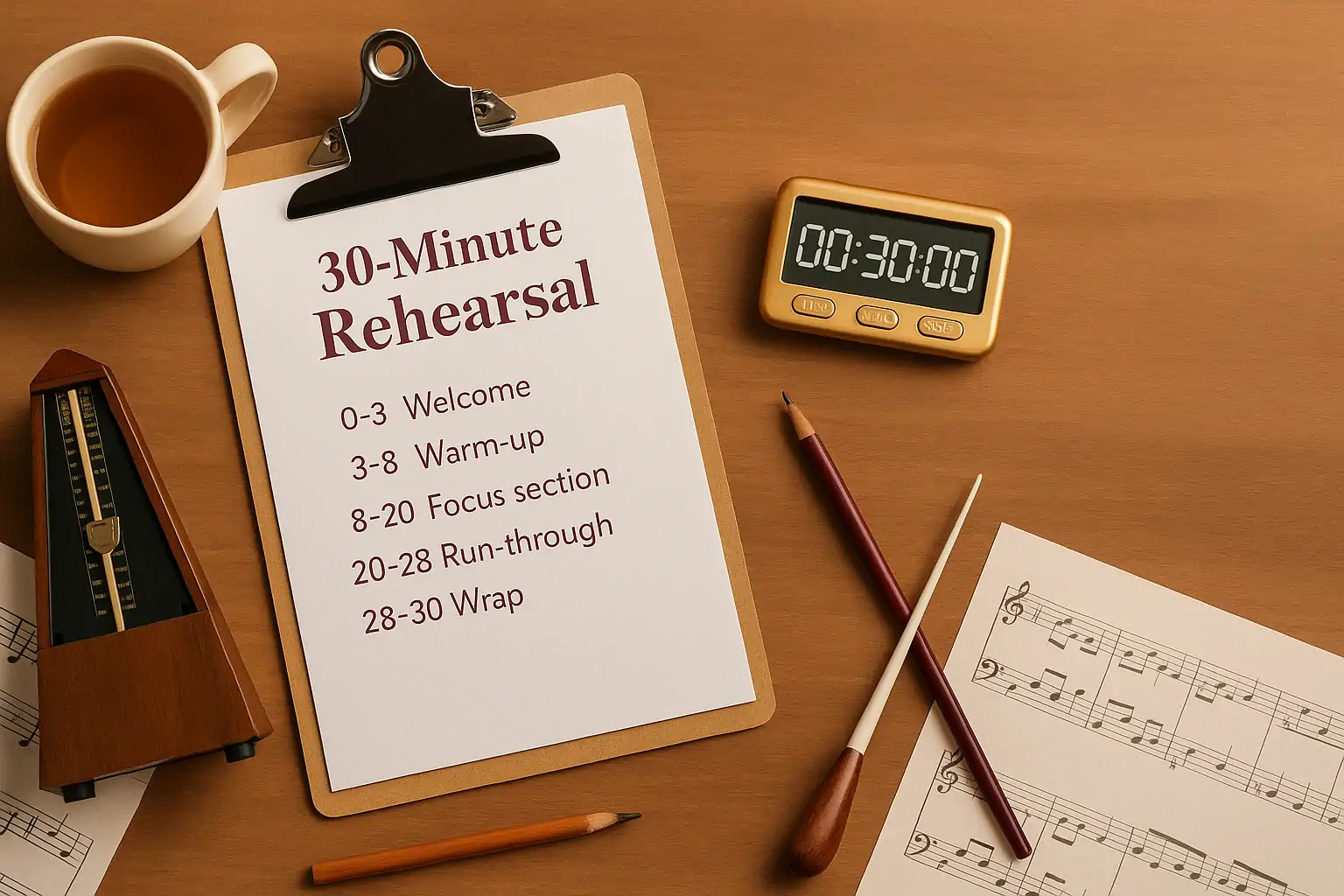Why 30 minutes can be enough
Many school and parish choirs only get a lunch break or a quick after-school slot. A short rehearsal succeeds when every minute has a job. Think one clear goal, a single focus section, and a clean finish so singers leave knowing they improved something specific.
Minute-by-minute plan (template)
0–3 · Welcome & goal
Take names, settle bodies, then state the goal in one sentence:
“Today we’ll unify vowels in bars 9–16 and shape the final cadence.”
3–8 · Warm up with purpose
- 1 min: Breath + posture (silent sniff, slow hiss)
- 90 sec: Resonance on ng–ah through the piece’s key
- 90 sec: Interval drill that appears in your focus section
- 1 min: Diction burst on the hardest phrase (“Gloria…”, etc.)
Warm-ups should sound like the music you’re about to sing.
8–20 · Teach or polish one section
- Speak text in rhythm, then sing melody only
- Add harmony one part at a time; don’t layer until the melody is secure
- Circle three bars that still need work—come back after a run
20–28 · Run something known
- One full performance of a familiar piece
- Fix two items only (tone/dynamics/ending), then run again
28–30 · Wrap & homework
- Recap: “We matched the [ɑ] vowel in bars 10–12 and nailed the rallentando.”
- Assign 60–90 sec of part learning with rehearsal tracks (QR code/URL)
- Confirm next rehearsal goal
Swap-ins for different choirs
SSA (young or treble-heavy):
- Keep melody in A/S1 for stability; give S2 a repeating counter-line
- Limit total singing to ~22 minutes; insert a 20-sec posture “shake-out”
SATB (small lower parts):
- Seat tenors near S2 for confidence; keep tenor tessitura C3–E4
- Let basses rest between low phrases; mark breaths together
Unison + descant (mixed ability):
- Teach unison quickly; give a short descant to strongest singers for the last verse
What to record (and why)
Use your phone for 10–20 sec clips:
- Focus snippet (bars 9–16) for at-home practice
- Model vowels on one tricky word
- Metronome tempo for the opening
Upload to a shared folder; title clearly: Piece – bars 9–16 – S/A – 92bpm.
Troubleshooting common time-sinks
- Fuzzy cut-offs: Agree on breath shape and hand cue; practise once in silence.
- Talky transitions: Pre-write the order on the board/slide; use a 3-word cue: “Bars 9—Ready—Sing.”
- Lost singers: Re-teach melody only; harmony returns after confidence does.
Rehearsal checklist
- ☐ Goal stated aloud
- ☐ One focus section, not three
- ☐ Two fixes on the run-through
- ☐ Tiny take-home task & link
Make it musical (not just efficient)
Even in 30 minutes, shape a phrase, colour a word, or craft a cadence. Singers will come back for that feeling.
Most recent episodes
Get notified when new sheet music is released
Be the first to know when Marianna publishes a new
arrangement or original piece — straight to your inbox.


.webp)

